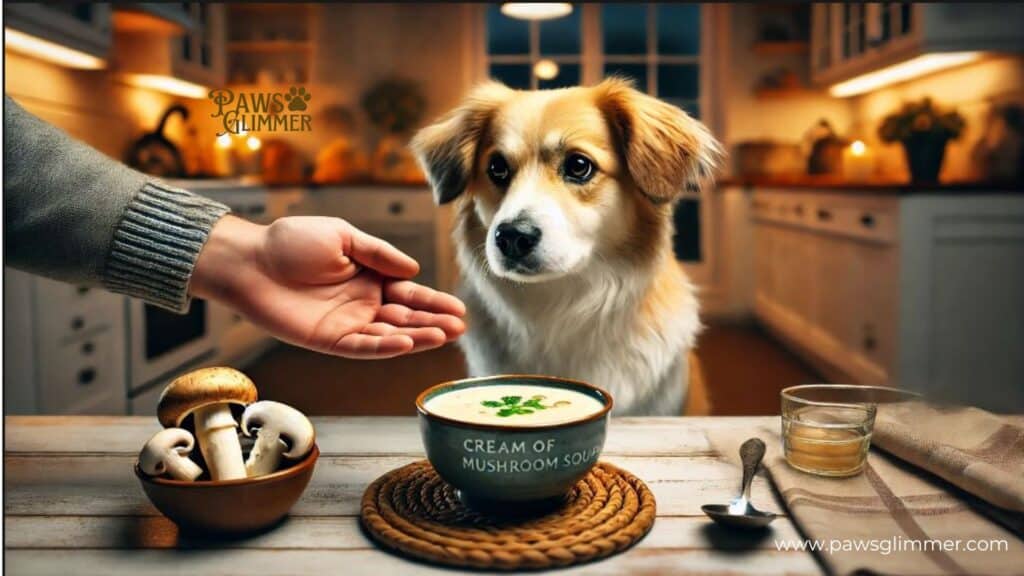As pet owners, it’s hard to resist sharing our favorite foods with our furry companions 🐾. But before giving your dog a taste, you might wonder: Is cream of mushroom soup safe for dogs?
While it may seem like a harmless treat, certain ingredients can be risky. Let’s dive into the facts and uncover how this dish could affect your dog’s health.
Deconstructing Cream of Mushroom Soup
Before we can determine whether this creamy concoction is suitable for our pets, we need to understand what goes into making it. Cream of mushroom soup typically contains a variety of ingredients, each of which may have different effects on our canine companions.
Signs Your Dog Might Be Saying Goodbye
Common Mushroom Soup Ingredients:
- Mushrooms (various types)
- Cream or milk
- Flour or other thickeners
- Onions and garlic
- Salt and seasonings
- Butter or oil
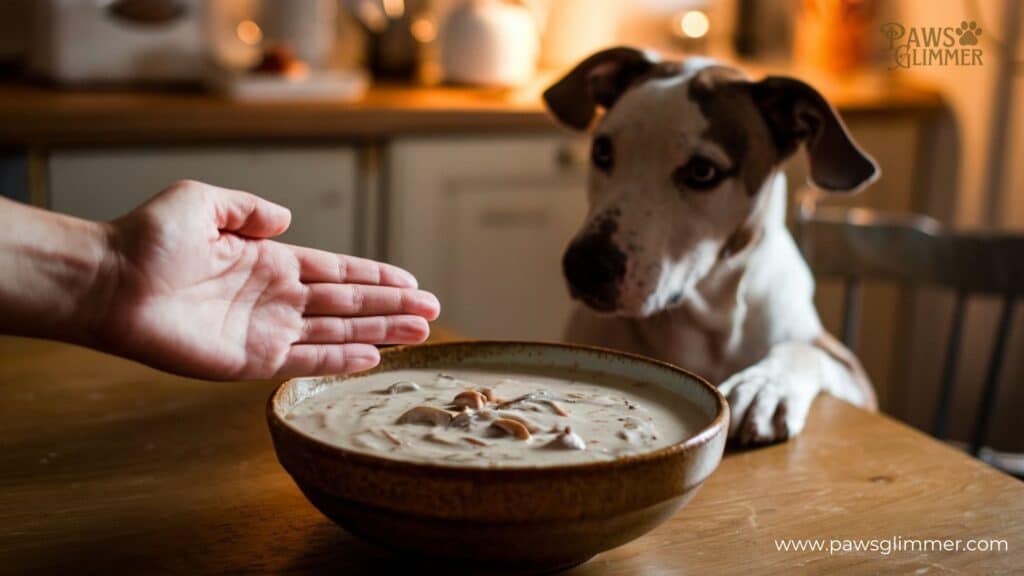
Let’s break down these components and their potential impacts on dog health:
| Ingredient | Potential Impact on Dogs |
|---|---|
| Mushrooms | Generally safe, but some varieties can be toxic |
| Cream/Milk | May cause digestive issues due to lactose |
| Flour | Usually harmless, but can contribute to weight gain |
| Onions/Garlic | Toxic to dogs, can cause anemia |
| Salt | Can lead to sodium ion poisoning if consumed in large quantities |
| Butter/Oil | High fat content may cause pancreatitis |
As we can see, while some ingredients are relatively harmless, others pose significant risks to our canine friends. This complex mixture of components makes it crucial for dog owners to exercise caution when considering sharing their cream-based soup with their pets.
The Mushroom Factor: Friend or Foe?
Mushrooms are the star of the show in cream mushroom soup, but their impact on dog health isn’t straightforward. While many mushrooms are safe for dogs, others can be downright dangerous.
Safe Mushrooms for Dogs:
- Button mushrooms
- Portobello mushrooms
- Shiitake mushrooms
- Porcini mushrooms
These varieties, often used in store bought mushroom soups, are generally considered safe for dogs in small quantities. However, it’s important to note that even safe mushrooms should be cooked and free from seasonings or additives that could be harmful to your pet.
Wild Mushrooms: A Dangerous Gamble
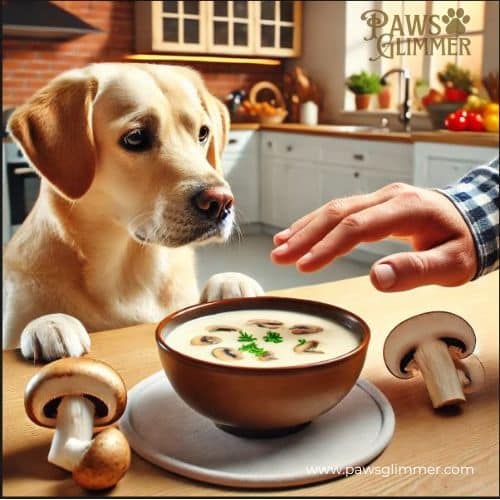
While commercial mushroom soups typically use safe, cultivated mushrooms, it’s crucial to be aware of the dangers posed by wild mushrooms. Foraging enthusiasts and dog owners alike should be cautious about wild mushrooms that their pets might encounter during outdoor activities.
“Wild mushrooms can be extremely dangerous for dogs. Some species can cause severe mushroom poisoning, leading to liver failure and even death,” warns Dr. Sarah Thompson, DVM, a veterinary toxicologist.
Mushroom poisoning symptoms can include:
- Vomiting
- Diarrhea
- Abdominal pain
- Lethargy
- Jaundice
- Seizures
If you suspect your dog has ingested wild mushrooms, seek veterinary care immediately. Time is of the essence in treating fungal toxicity.
Dairy Dilemma: Creamy Consequences
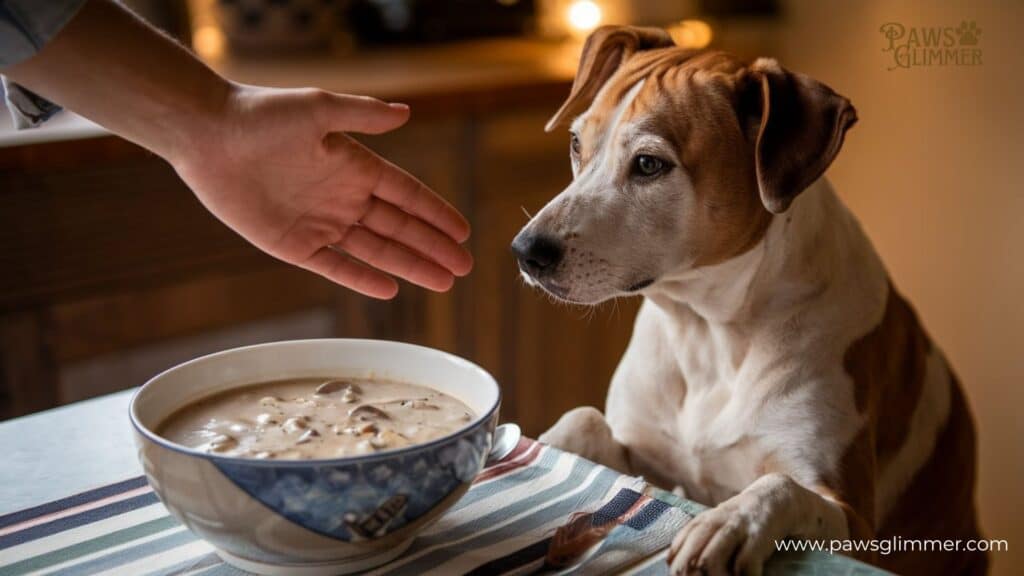
The “cream” in cream of mushroom soup presents another set of challenges for our canine friends. Many dogs are lactose intolerant, meaning their bodies lack the enzyme necessary to properly digest milk and dairy products.
Potential digestive issues from consuming dairy include:
- Bloating
- Gas
- Diarrhea
- Vomiting
Moreover, the high fat content in cream can lead to more serious problems, such as pancreatitis, especially in dogs prone to this condition. This inflammation of the pancreas can be painful and potentially life-threatening if left untreated.
More on Keeping Your Dog Safe from Harmful Foods
Hidden Dangers: Beyond the Main Ingredients
While mushrooms and cream are the primary components of concern, other ingredients in cream mushroom soup can pose significant risks to our canine companions.
Onion and Garlic: Toxic Troublemakers
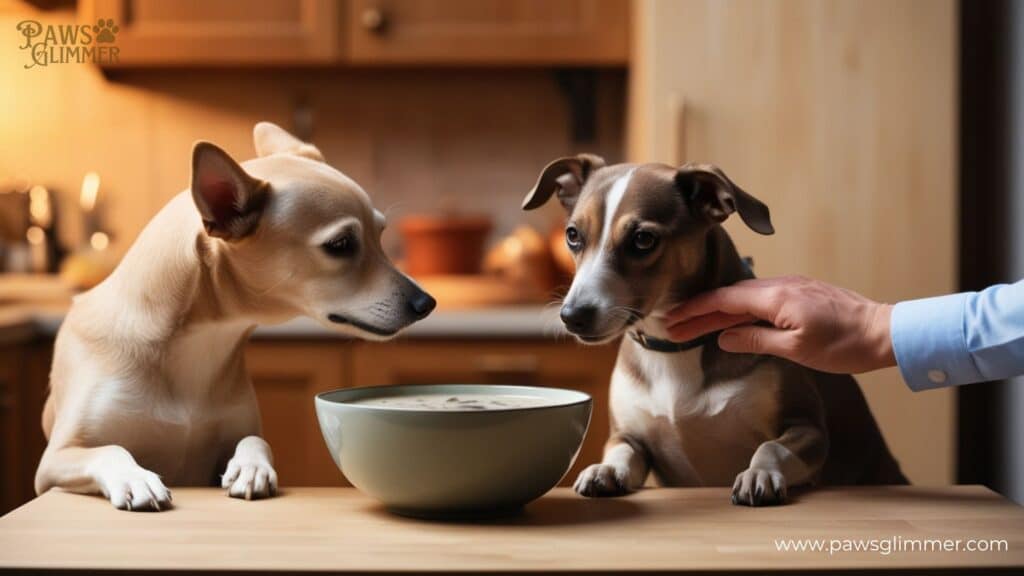
Onions and garlic, common flavor enhancers in many soups, are members of the Allium family and are toxic ingredients for dogs. These vegetables can cause damage to a dog’s red blood cells, potentially leading to anemia.
Signs of onion or garlic toxicity include:
- Weakness
- Lethargy
- Reduced appetite
- Pale gums
- Dark-colored urine
Even small amounts of onion or garlic can be harmful, making it crucial to avoid feeding dogs any foods containing these ingredients.
Salt: A Savory Danger
While a pinch of salt might not seem harmful, the salt content in cream of mushroom soup can be dangerous for dogs. Excessive salt intake can lead to sodium ion poisoning, which can cause:
- Excessive thirst and urination
- Vomiting
- Diarrhea
- Tremors
- Seizures
- In severe cases, kidney damage
Dogs have different sodium requirements than humans, and their bodies are not equipped to handle the high salt content often found in human foods.
Weighing the Risks: Can Dogs Eat Cream of Mushroom Soup?
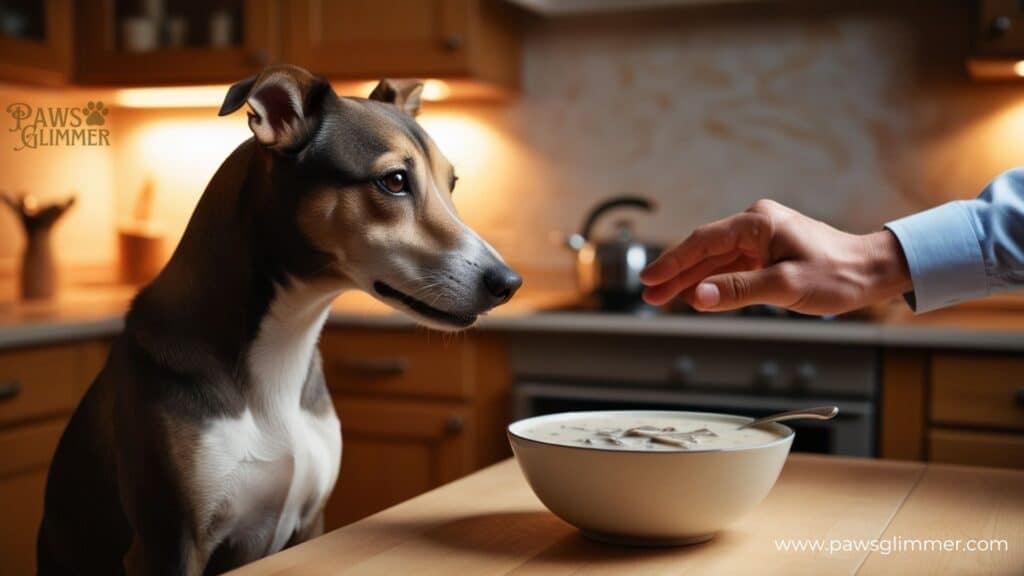
Given the potential risks associated with various ingredients in cream mushroom soup, it’s generally not recommended to feed this dish to your dog. While small amounts might not cause immediate harm in some cases, the potential risks outweigh any possible benefits.
Factors Influencing Safety:
- Size of the dog: Smaller dogs are more susceptible to the negative effects of inappropriate foods.
- Amount consumed: Even a small amount can cause digestive issues in sensitive dogs.
- Frequency of consumption: Regular ingestion of unsuitable foods can lead to long-term health problems.
- Individual sensitivities: Some dogs may have specific allergies or intolerances.
Alternatives and Safe Options
For dog owners who want to treat their pets to something special, there are safer alternatives to cream of mushroom soup.
Dog-Friendly Mushroom Recipe
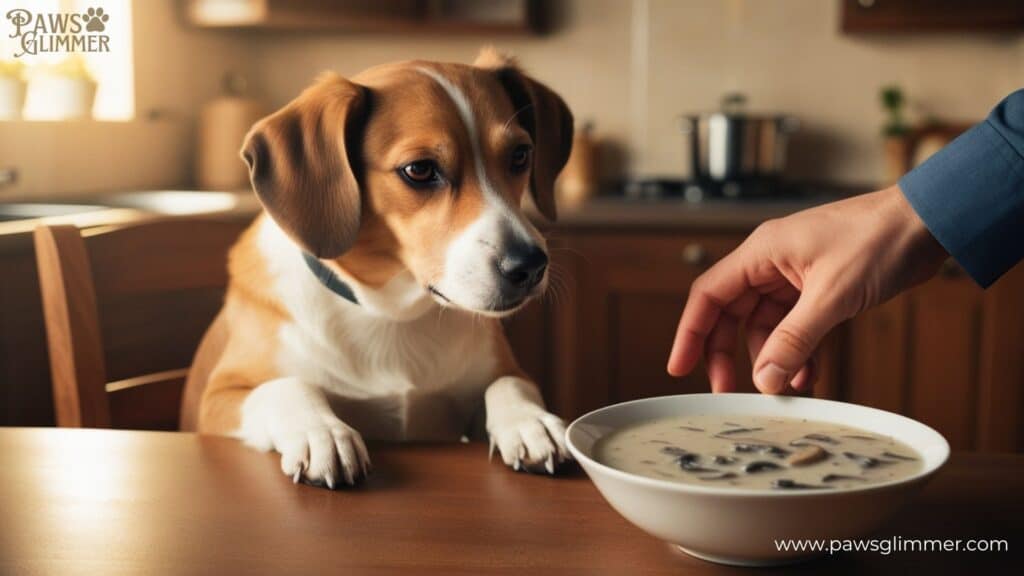
If you’re set on sharing the mushroom experience with your furry friend, consider this simple, dog-safe mushroom broth:
Ingredients:
- 1 cup chopped, dog-safe mushrooms (e.g., button mushrooms)
- 4 cups low-sodium chicken broth
- 1 tablespoon olive oil
Instructions:
- Sauté mushrooms in olive oil until softened.
- Add chicken broth and simmer for 15 minutes.
- Let cool and serve a small amount as a treat.
Remember, even safe treats should be given in moderation and should not make up more than 10% of your dog’s daily caloric intake.
Commercial Dog Foods with Mushroom Ingredients
Some pet food manufacturers have recognized the potential benefits of mushrooms and have incorporated them into their products. These foods are formulated specifically for dogs and can be a safe way to introduce mushrooms into your pet’s diet.
Emergency Situations: When Things Go Wrong
Despite our best efforts, accidents can happen. If your dog manages to sneak a taste of cream of mushroom soup, it’s important to know what signs to look for and what actions to take.
Signs of Adverse Reactions:
- Vomiting
- Diarrhea
- Lethargy
- Loss of appetite
- Abdominal pain
- Excessive thirst or urination
If you notice any of these symptoms after your dog has consumed cream of mushroom soup, it’s best to consult with your veterinarian. They may recommend monitoring your pet at home or bringing them in for an examination, depending on the severity of the symptoms and the amount consumed.
“When in doubt, it’s always better to err on the side of caution and seek professional advice,” says Dr. Emily Roberts, a small animal veterinarian. “Prompt treatment can make a significant difference in cases of food-related illnesses in dogs.”
The Verdict: To Share or Not to Share?
After examining the various components of cream mushroom soup and their potential effects on dog health, it’s clear that this human food is not an ideal treat for our canine companions. While the occasional lick might not cause immediate harm to all dogs, the risks associated with ingredients like onions, garlic, and high fat content make it a food best kept out of reach of our furry friends.
As responsible pet parents, it’s our duty to ensure that our dogs receive a balanced diet appropriate for their species. While it’s tempting to share our favorite foods, it’s important to remember that dogs have different nutritional needs and sensitivities than humans.
FAQs: Addressing Common Concerns
Q: Is cream of mushroom soup toxic to dogs?
A: While not all ingredients in cream of mushroom soup are toxic, some components like onions and garlic can be harmful to dogs. The high fat and salt content can also cause digestive issues and other health problems.
Q: Can dogs eat any type of mushroom soup?
A: It’s best to avoid feeding dogs any type of mushroom soup made for human consumption. However, there are dog-safe mushroom broths that can be prepared at home using dog-friendly ingredients.
Q: How much cream of mushroom soup is dangerous for dogs?
A: Even small amounts of cream of mushroom soup can cause digestive issues in some dogs. The exact amount that could be dangerous varies depending on the dog’s size, overall health, and individual sensitivities.
Q: Are there any health benefits for dogs in consuming cream of mushroom soup?
A: While mushrooms themselves can offer some nutritional benefits, the risks associated with other ingredients in cream of mushroom soup outweigh any potential benefits for dogs.
Q: What should I do if my dog accidentally ingests cream of mushroom soup?
A: Monitor your dog for any signs of digestive upset or unusual behavior. If you notice any concerning symptoms or if your dog has consumed a large amount, contact your veterinarian for advice.
Conclusion: Prioritizing Canine Wellness
In the quest to provide the best for our furry companions, it’s crucial to make informed decisions about their nutrition. While cream of mushroom soup might be a comforting treat for humans, it’s not a suitable food for dogs. The combination of potentially toxic ingredients, high fat content, and other problematic components makes it a risky choice for canine consumption.
Instead of sharing our soup, we can show our love for our pets by providing them with a balanced diet formulated for their specific needs. There are plenty of safe, healthy treats available that can satisfy our desire to pamper our pups without putting their health at risk.
Remember, when it comes to dog health, prevention is always better than cure. By keeping harmful foods out of reach and sticking to dog-appropriate diets and treats, we can ensure our faithful friends lead happy, healthy lives by our side.

Raymond Dandan is a seasoned pet blogger with a passion for feline care and behavior. With years of experience and a deep love for cats, Raymond brings expert insights and practical tips to “PawsGlimmer.” His engaging writing and thorough research help cat owners provide the best for their furry friends, making him a trusted voice in the pet community.

